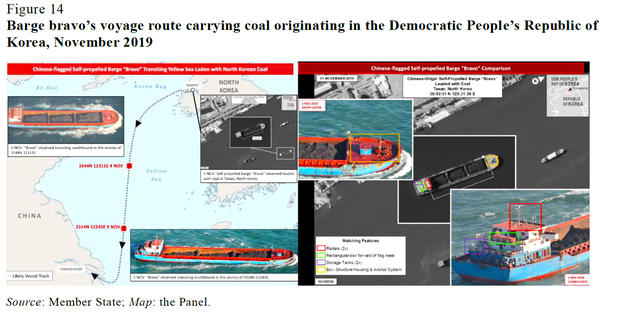North Korea is advancing its nuclear program and increasing illicit trade, new UN report says
North Korea is advancing its nuclear program and increasing illicit trade in new and more opaque ways, according to a 267-page U.N. report that provides surveillance photos and new evidence.
The annual report, produced by sanctions monitors called the "Panel of Experts," is a product of the U.N. Security Council. The purpose of the report is to offer recommendations on how to hold North Korea accountable for skirting restrictions imposed by U.N. sanctions since 2006, that are designed to curtail the nation's nuclear weapons program.
CBS News reported on the contents of the U.N. report in February — but the final report, which CBS News has now obtained, is set to be published next week.
Nuclear program and ballistic missiles
The report claims North Korea has not halted "its illicit nuclear and ballistic missile programs, which it continued to enhance, in violation of Security Council resolutions," and that "it continued to develop infrastructure and capacity for its missile program."
Two missile engine tests on December 7 and 13, 2019, may have been "aimed at qualifying new intercontinental ballistic missile engines (liquid propellant) or checking existing engine batches (possibly solid propellant)," according to the report. But either way, the report concludes, they "point to a new phase in the ballistic missile program."
Although North Korea has dodged sanctions for many years, the report says, the government of Kim Jong Un has "continued to flout Security Council resolutions through illicit maritime exports of commodities, notably coal and sand," in order to "provide a revenue stream that has historically contributed to the country's nuclear and ballistic missile programs."
For the components of and technology for its missile program, North Korea uses "illicit external procurement," some of which is documented by U.S.-provided imagery, data and calculations, the report adds.
Illicit imports of petroleum and exports of coal
Detailed satellite imagery, invoices, and maps obtained by the report authors that North Korea illicitly imported refined petroleum products "through ship-to-ship transfers and through direct deliveries by foreign-flagged vessels," according to the report.
The report says that the annual cap for 2019, set by the U.N., for the purchase of 500,000 barrels of refined petroleum products "was exceeded many times over."
The report also describes vessels carrying illicit coal shipments anchored in Chinese waters, near the Ningbo-Zhoushan and Lianyungang port areas. But it assigns no blame to China, which denies allowing violations of the sanctions. All coal exports have been prohibited by U.N. sanctions since 2017.
The rationale for the deliveries to these ports, the report says, rather than ports previously used in the Gulf of Tonkin, "has the advantage for the Democratic People's Republic of Korea of making deliveries more cost-effective, and likely contributes to reducing the country's vessels' exposure to scrutiny."
The nation's new methods are opaque and specifically designed to hide the illicit activities, according to the report. North Korea, and individuals acting on its behalf, "continue to advance, adapt and develop their evasion techniques to avoid the detection, identification and monitoring of activities prohibited by the resolutions," the report says.
Cited is "a relatively new practice" that involves vessels that want to "avoid tracking by moving into the territorial waters of Member States, knowing that they cannot be followed."
North Korea increased its illicit exports of coal in 2019, according to the report. Between January and August, it exported 3.7 million tons of coal, valued at $370 million. But between May and August, the increase in volume "was about 191 per cent compared to the first four months of the year," the report says.
"The increase in the number of such activities around the affected port areas heightens the need for due diligence and countermeasures by the relevant authorities regarding prohibited cargoes exported from ports of the Democratic People's Republic of Korea," the report adds.




